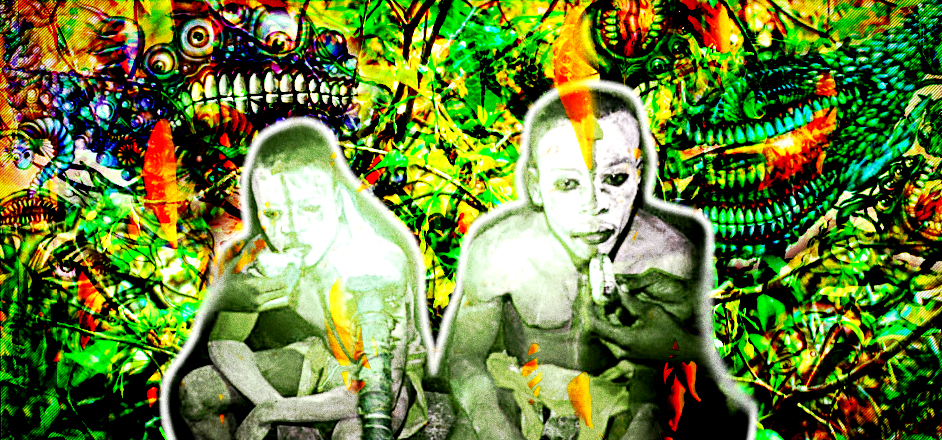Westerners have discovered the scariest drug in the world. And they're doing it so much we're running out of it.
It's a hallucinogen called ibogaine, and it feels like two days in the African version of Dante's Hell.
"I was pounded with total insanity," says one online trip report. Just "vomiting and vomiting and vomiting" and feeling like "gremlins were going about my body beating the shit out of every organ," says another. In fact, ibogaine messes with your heart so badly, it's best to have an AED nearby.
"Clear! Zap! Okay, you're good to keep tripping."
"You don't do it for fun," says Peter Evans, 32. And Evans adores the stuff.
See, before he tried it, heroin took Evans halfway to the grave. He twice overdosed his way into the emergency room. He would've died, he says, if the heroin antidote naloxone hadn't brought him back like Lazarus.
However, while naloxone is a temporary cure for too much heroin, ibogaine can be a permanent one. Its hellish, mechanized car wash of a trip somehow scrubs you clean of your addictions. Evans says ibogaine cured his heroin addiction "completely, immediately."
And while a few people do it for kicks or for personal growth, and an African religion uses it as a sacrament, it's primary function in the West is addiction curing. Clare Wilkins, a former heroin addict and current ibogaine therapist in a Mexican clinic, explains it like this: "It's like when you take a giant shit, and you feel really really awful during it, and then you feel great after."
Geoff Noller, a researcher in New Zealand who has studied ibogaine, says he's seen "exceptional results" with ibogaine, with about half of addicts shedding their jones for heroin.
With its amazing and disgustingly vomit-producing promise, the ibogaine treatment industry is growing "exponentially." Ibogaine is legal in every country except a small handful; one of those countries is the United States. Thus, you'll need to travel to find it; most likely to Canada or Mexico, the latter of which is the current nexus of ibogaine treatment. It's blowing up there. A decade ago, Wilkins says, there were four clinics in Mexico, and a four-day treatment course cost about $4,000. Today, there are 17 clinics, and the average cost is around $7,000 or $10,000. There are even luxury retreats where you pay $35,000 to stay in a posh hotel where you relax on chaise lounges by an azure ocean before tripping into a horrific episode of "Black Mirror."
Lured by this big money, opportunists have been setting up ibogaine clinics with about as much forethought as you'd use to start selling tamales out of your car, critics say. "People were like, oh, let's make money," Wilkins says, "off people's desperation."
Predictably, prices for the drug have skyrocketed, and it now costs 10 times as much as it did a decade ago, $200,000 a kilo — three times the cost of a kilo of cocaine.
In 2009, crisis hit and ibogaine got scarce. Iboga, the plant ibogaine is made from, grows only in a small corner of West Africa. The valuable iboga fields have been harvested and poached so fast it was been called "an ecological disaster." The situation was worsened by Asian ivory poachers. Elephants naturally eat the iboga and shit out the seeds, spreading the plant (some people think the elephants like tripping). As poachers slaughter the elephants, the seeds go unspread. And so, some clinics, unable to get the drug, were forced to shut down. Others paid five or ten times their normal price for a drug that, remember, that kills about one in every 300 people who do it.
Since the crisis, the worldwide ibogaine community has sprung into action, desperate to avoid losing a plant that is a medical treasure, yet also feels a bit like a gang initiation. They're grabbing seeds from West Africa and sowing iboga farms in Mexico, Costa Rica and a few other fertile places, as well as growing it in greenhouses in environmentally harsher places, like British Columbia.
"Because of its gifts," says David Gaian, "we were on a three to five year trajectory toward totally wiping it out."
Gaian is co-founder and COO of Symbio Life Sciences, whose CEO is the psychedelic legend Dennis McKenna. Symbio is going high-tech with its efforts. It's growing iboga root in laboratory petri dishes, which is quicker than growing the whole plant. They're hoping to have quality, consistent, safe ibogaine ready for sale soon.
"There's certainly a lot of pressure on that plant; it's a scarce resource," says Noller, the researcher. "It's going to have to be managed really well."
But with "more people growing iboga than ever before," as Wilkins says, she and others are hopeful that we'll never run out of this drug. And addicts and seekers will forever be able to seek the healing powers of a plant that feels like "dying," "frying my brain," "absolute torture" and leaves trippers in the fetal position "feeling like shit."
And how great is that?




Leave a Reply